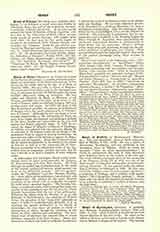

Henry of Herford (or HERWORDEN; HERVORDIA), friar and chronicler; date of birth unknown; died at Minden, October 9, 1370. He was a native of Herworden, Westphalia, and was professed in the Dominican friary at Minden. There he wrote his chronicle “Liber de rebus memorabilioribus”, in which he summarizes the work of older historians from Eusebius down to the writers of his own age. The work, which is continued down to the coronation of the Emperor Charles IV in 1355, was one of the chief sources of historical information in fourteenth-century literature. It was printed under the editorship of Potthast at Gottingen in 1859. He also composed the “Catena aurea in decem partes distincta”, a summary of theology, and a treatise—still unpublished—”De Conceptione Virginis gloriosae”. Seven years after his death the emperor caused his remains to be solemnly transferred to a place of honor near the high altar.
EDWIN BURTON

